In today’s fast-paced world, the concept of self-care has gained significant attention. Yet, many individuals struggle with practicing self-care without experiencing feelings of guilt. Understanding and implementing guilt-free self-care is essential for maintaining overall well-being and leading a balanced life.
Understanding Self-Care
Self-care refers to the deliberate activities and practices individuals engage in to maintain and enhance their physical, mental, and emotional health. It encompasses various aspects, including nutrition, physical activity, mental health, personal relationships, and overall lifestyle choices. Engaging in self-care is not a luxury but a necessity for sustaining a healthy and fulfilling life.
The Importance of Self-Care
Prioritizing self-care offers numerous benefits:
- Physical Health: Regular exercise, balanced nutrition, and adequate rest strengthen the immune system and reduce the risk of chronic illnesses.
- Mental Well-being: Activities like meditation, journaling, or therapy sessions can alleviate stress, anxiety, and depression.
- Emotional Balance: Engaging in hobbies and spending time with loved ones fosters joy and contentment.
- Enhanced Productivity: Taking breaks and setting boundaries prevent burnout, leading to increased efficiency in daily tasks.
Why Do We Feel Guilty About Self-Care?
Despite its benefits, many people feel guilty about practicing self-care. This guilt often stems from societal expectations, personal beliefs, or the pressure to constantly be productive. Common reasons for self-care guilt include:
- Cultural Conditioning: Many societies equate self-sacrifice with virtue, making self-care seem selfish.
- Fear of Judgment: People worry about being perceived as lazy or indulgent when prioritizing their needs.
- Workaholic Mindset: A culture of overworking often makes people feel guilty for taking time off.
- Family and Social Obligations: Many feel they must always put others’ needs before their own, leading to burnout.
Overcoming Self-Care Guilt
To practice self-care without guilt, it’s important to shift your mindset and implement practical strategies. Here’s how:
1. Reframe Self-Care as a Necessity, Not a Luxury
Recognize that taking care of yourself is essential for your well-being. When you’re physically and mentally healthy, you’re better equipped to help others and fulfill responsibilities.
2. Set Boundaries and Say No
Learn to say no to commitments that drain your energy or do not align with your priorities. Boundaries protect your time and mental health.
3. Schedule Self-Care Like an Appointment
Treat self-care activities as non-negotiable appointments. Whether it’s a workout, reading a book, or spending time with friends, schedule it and stick to it.
4. Start Small and Build Consistency
Incorporate small self-care activities into your daily routine. Even a five-minute meditation or a short walk can make a difference.
5. Practice Mindfulness and Gratitude
Being present and appreciating the moment helps reduce guilt. Acknowledge that you deserve care just as much as anyone else.
6. Challenge Negative Thoughts
If you feel guilty, ask yourself: “Would I judge a friend for taking care of themselves?” More often than not, the answer is no.
7. Seek Support from Like-Minded Individuals
Surround yourself with people who value self-care and encourage you to prioritize your well-being.
Types of Self-Care to Incorporate into Your Life
Self-care is not one-size-fits-all. It varies based on individual needs and preferences. Here are different types of self-care:
1. Physical Self-Care
- Exercise regularly
- Eat nutritious meals
- Get sufficient sleep
- Stay hydrated
2. Emotional Self-Care
- Express emotions through journaling or art
- Practice self-compassion
- Engage in activities that bring joy
3. Mental Self-Care
- Read books or listen to podcasts
- Limit screen time and social media consumption
- Learn something new
4. Social Self-Care
- Spend quality time with family and friends
- Join a community or group with shared interests
- Reach out for emotional support when needed
5. Spiritual Self-Care
- Meditate or practice mindfulness
- Engage in religious or spiritual practices
- Spend time in nature
Conclusion: Prioritizing Yourself Without Guilt
Self-care is not an indulgence—it is a fundamental necessity. By shifting your mindset, setting boundaries, and incorporating self-care practices into your daily routine, you can care for yourself without guilt. When you prioritize your well-being, you enhance not only your life but also the lives of those around you. Embrace self-care as an act of self-respect, and remember: you deserve to be taken care of too.
